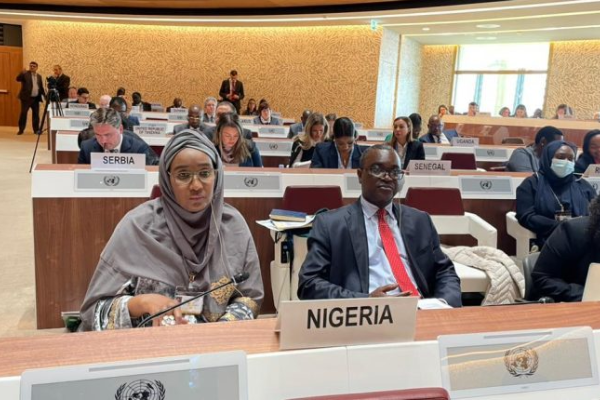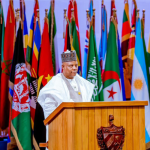The Federal Government has asked for international cooperation in resolving issues relating to migration and refugee crises.
At the 73rd session of the Executive Committee, EXCOM, of the High Commissioner’s Programme in Geneva, the Minister of Humanitarian Affairs, Disaster Management, and Social Development, Sadiya Umar Farouq, requested cooperation.
The Minister listed the initiatives and regulations the Nigerian government had put in place to enhance the provision of humanitarian aid in Nigeria, with a focus on refugees, migrants, and internally displaced people.
Umar Farouq urged global stakeholders to abstain from racism and bigotry in order to establish lasting peace and enhance the living conditions of disadvantaged communities.
“Nigeria calls for global collaboration and cooperation with burden sharing and solidarity, particularly to refugee origin and host countries impacted by crises. This is in line with our commitment as Member State to the Global Compact for Refugees.
“Nigeria commends the sustained efforts of UNHCR. We also call on the UNHCR and other migration stakeholders, to continue to work with the Nigerian government towards aligning policies and programs alongside our national development priorities and values as a nation.
“The negative impact of climate change in the Lake Chad Basin has increased the number of displaced persons in the region. More recently, floods and other extreme climatic events have contributed to an additional wave of internal displacement. On the part of our government, we are implementing the National Flood Emergency Preparedness and Response Plan to enhance preparedness, build resilience of affected local communities in line with the Sendai Framework. We are seeking partnerships to mitigate and adapt to climate change especially in the displacement context.
“Racism and discrimination should have no place in our world today if we are to build sustainable peace, foster prosperity and improve livelihoods and resilience in a manner that preserves the environment and protects vulnerable populations.”
Under the auspices of the Tripartite Agreement between Nigeria, Cameroon and UNHCR, over 5, 000 Nigerian refugees have been voluntarily repatriated to the country.
Nigeria has experienced a rise in the number of asylum seekers and refugees from nearby nations during the past six years.
In addition to the more than 5,000 recently arrived unregistered Cameroonian refugees and asylum seekers, Nigeria is home to 84,314 registered refugees and asylum seekers from 34 different countries.
About 341,642 Nigerian refugees are dispersed throughout Cameroon, Chad, and the Niger Republic.














